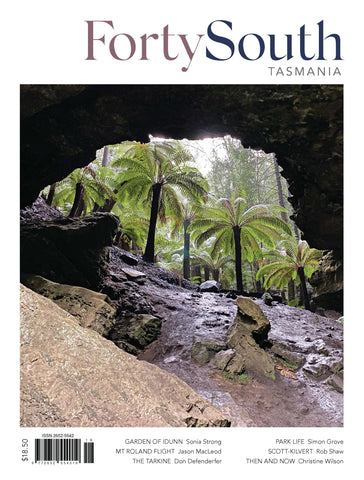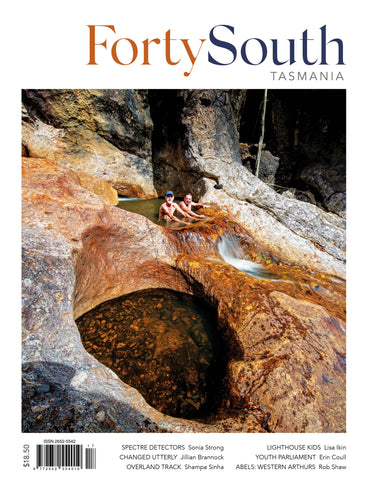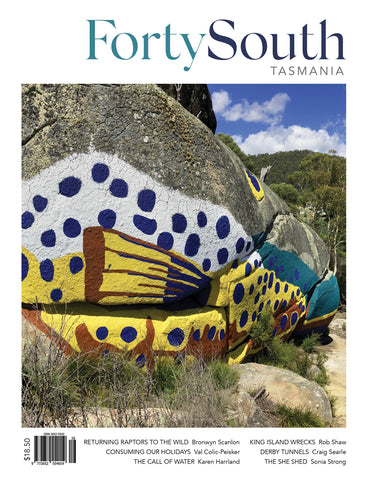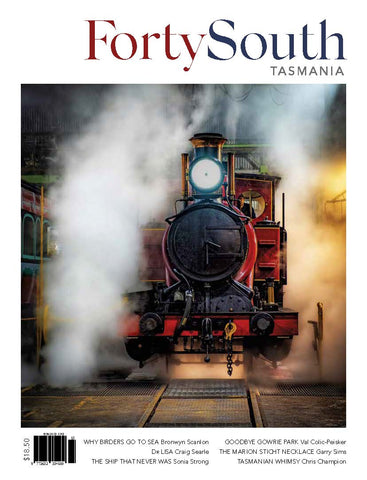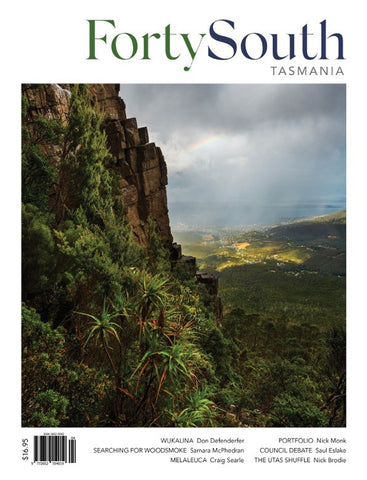
Forty South Tasmania Issue 104, Autumn 2022
INSIDE ISSUE 104
wukulina | Don Defenderfer
Searching for the smell of woodsmoke | Samara McPhedran
Melaleuca time | Craig Searle
Portfolio: Quiet places | Nick Monk
Tasmanian Voices: Council debate | Saul Eslake
The UTAS shuffle | Nick Brodie
A life's work in Southern Ocean Science | Katherine Johnson
Then and Now: A portrait of the writer as a young woman | Lian Tanner
Abels: A double bag | Rob Shaw
AND MORE...
From the editor:
When Don Defenderfer heads into the Tasmanian bush, he finds calmness and connection. When he writes about it for Forty South, I find calmness and connection. His piece in this issue, entitled simply wukalina, is as beautiful as anything I have ever read about this land.
Back in less-calming urban areas, life in Tasmania was very different just 30 years ago, and especially for school-leavers. Life in Tasmania in the early 1990s was about “fierce working class pride, kids leaving school after Grade 10 without anybody batting an eyelid, wealth and poverty rubbing shoulders, and people dying early after living tough lives”. They are the words of one of those school-leavers, one who “like many of my generation … left Tasmania for the fabled mainland”. Dr Samara McPhedran has achieved much since joining that exodus, but as she explains in this absorbing piece, something of the essence of Tasmania has travelled with her.
It seems that wherever I have been in my love of old bookshops, disturbing dust to discover wondrous rooms, passages and corners that to me are the truly magical spaces of the world, Rayne Allinson has been there before me. Especially in Tasmania, which can lend dark and Gothic narratives to the places where books have historically been kept. She speaks so ardently about this that it was clear what I had to do: I asked her to write about it. This
column is for book lovers, but it is at heart about the places where books are gathered. There is a difference. The distinction is as small as a subtle point of definition, and as large as the universe to which, for human beings, books are the only mode of travel, and bookshops the portal.
Local government is often in the news in Tasmania, and rarely for positive reasons. Both the national and state governments have over the years conducted or commissioned studies on how to improve efficiencies, with the one major constant recommendation being a reduction in the number of councils. The number has been reduced – from 49 to 29 – but evidence that we would be better off with as few as eight super councils has failed to win support from a majority of either councillors or ratepayers. The issues can be complicated, but Saul Eslake cuts through the politics and rhetoric and looks at the past, present and potential future from the clearest perspective – the community level.
The plan to move the Hobart campus of the University of Tasmania from Sandy Bay to the city has created a lot of debate, much of it heated. But it isn’t the first time the Hobart campus has been moved, and it isn’t the first time heated words have been exchanged, as Nick Brodie reports.
We Also Recommend


